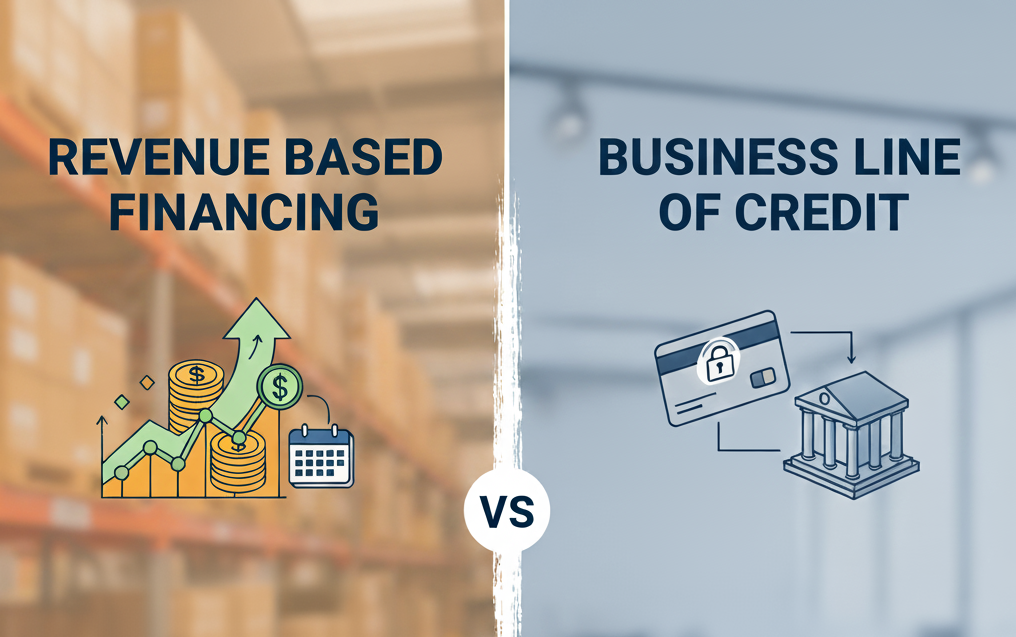Revenue Based Financing vs Business Line of Credit: Which Funding Option Fits Your Business?
When your business needs capital, choosing between revenue based financing vs business line of credit can significantly impact your company's financial health and growth trajectory. Both options offer unique advantages, but understanding their differences in access speed, repayment flexibility, and approval processes is crucial for making the right decision.
Revenue-based financing has gained popularity as investors purchase projected revenue streams, while business lines of credit provide traditional borrowing flexibility. Each option serves different business models and financial situations, making it essential to evaluate which aligns with your company's cash flow patterns and long-term goals.
Understanding Revenue-Based Financing Fundamentals
Revenue-based financing fundamentals center on a unique funding model where investors purchase a portion of your company's future revenue streams. This approach differs significantly from traditional financing methods, as repayments fluctuate based on your actual business performance rather than fixed monthly amounts.
- Investors provide upfront capital in exchange for a percentage of future revenue
- Repayment amounts adjust automatically with your business income fluctuations
- No personal guarantees or collateral requirements typically apply
- Funding decisions often focus on revenue history rather than credit scores
- Default risk decreases since payments align with actual business performance
This financing structure may be particularly attractive for businesses with seasonal revenue patterns or those experiencing rapid growth phases. The flexibility built into revenue-based financing can help companies manage cash flow challenges while accessing the capital needed for expansion or operational improvements.
Business Line of Credit Essentials
Business line of credit essentials revolve around providing companies with flexible access to funds up to a predetermined limit, similar to how personal credit cards function. This revolving credit facility allows businesses to draw funds when needed and pay interest only on the amount used.
- Access funds up to your approved credit limit as needed
- Pay interest only on the amount you actually use
- Revolving credit means funds become available again as you repay
- Fixed monthly payments based on outstanding balance
- Suitable for managing ongoing operational expenses and cash flow gaps
Lines of credit typically work best for businesses with predictable cash flows and established credit histories. They offer the convenience of having funds available without the need to reapply each time you need capital, making them ideal for covering seasonal fluctuations or unexpected expenses.
Access Speed and Approval Process Comparison

Access speed and approval process differences between these funding options can significantly impact your ability to capitalize on business opportunities or address urgent financial needs.
- Revenue-based financing often provides quicker access with streamlined approval processes
- Documentation requirements may be less extensive for revenue-based options
- Business lines of credit typically require more thorough credit evaluations
- Traditional lenders might take longer to process line of credit applications
- Revenue-based financing decisions often focus on business performance rather than personal credit
The approval timeline can vary significantly between providers, but revenue-based financing tends to offer faster access to capital. This speed advantage stems from the focus on existing revenue patterns rather than extensive financial documentation and credit history reviews that traditional lines of credit require.
Repayment Flexibility and Structure Analysis
Repayment flexibility and structure differences between these financing options can make or break your business's ability to manage cash flow effectively while meeting funding obligations.
- Revenue-based financing adjusts payments based on actual business income
- Lower revenue months result in proportionally lower payment amounts
- Business lines of credit require consistent monthly payments regardless of revenue
- Fixed payment schedules with lines of credit provide predictable expense planning
- Revenue-based repayments may better accommodate seasonal business fluctuations
This flexibility difference becomes particularly important for businesses with variable income streams. Companies experiencing growth phases or seasonal variations might find revenue-based financing more manageable, while businesses with steady cash flows may prefer the predictability of fixed line of credit payments.
Choosing the Right Financing for Your Business
Choosing the right financing for your business requires careful evaluation of your company's specific needs, cash flow patterns, and growth objectives. The decision between revenue-based financing and business lines of credit should align with your operational requirements and financial capabilities.
- Assess your cash flow consistency and seasonal variations
- Evaluate your immediate capital needs versus ongoing funding requirements
- Consider your credit history and ability to meet fixed payment obligations
- Analyze the total cost of each funding option over time
- Determine which repayment structure better supports your business model
Businesses with fluctuating revenues might benefit more from revenue-based financing's adaptive payment structure, while companies with steady income streams may prefer the predictable costs associated with traditional lines of credit. The choice ultimately depends on matching the financing structure to your business's unique financial profile and growth strategy.
Understanding the key differences between revenue based financing vs business line of credit empowers you to make informed funding decisions that support your business's success. While revenue-based financing offers flexibility that adapts to your income fluctuations, business lines of credit provide predictable access to funds with fixed repayment terms.
The right choice depends on your specific business model, cash flow patterns, and growth objectives. Consider factors like access speed, repayment flexibility, and approval requirements when evaluating these options. Remember that the best financing solution aligns with your company's operational needs while supporting sustainable growth and financial stability.

.png)






